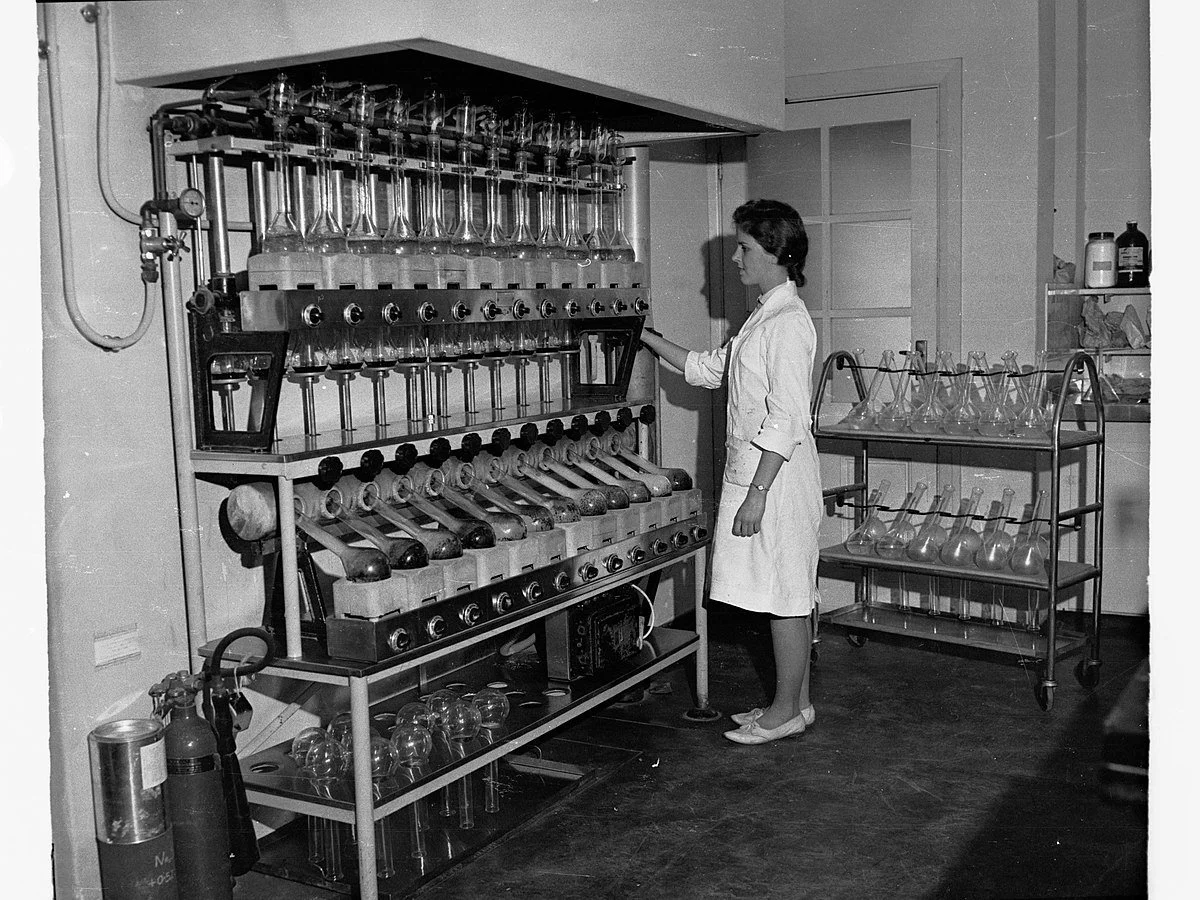Doctor Atomic and the scientist’s concern over politics - Part 2
Opera’s id:
Composer: John Adams
Libretto: Peter Sellars
Language: English
Premiere: San Francisco Opera, 2005
As we saw in the first part of the exploration on Doctor Atomic, the first scene of the opera confronts the scientists working on the creation of the atomic bomb with three competing models of action, in view of the prospect of their discoveries being used in war. Reflecting the course of events in real life, the scenes that follow are determined by the decision of Oppenheimer – the project’s leader – to understand his role in a technocratic way. Refusing to view his actions as political, Oppenheimer confined his role to providing scientific advice to a government. He trusted this government to make the best decisions, based on the information it received from experts working on different fields. In the following scenes of the opera, we can see the repercussions of this stance.
The scientist’s ascent to superhuman
The opera’s second scene takes place in the Oppenheimers’ household. It reflects a private moment between Oppenheimer and his wife Kitty. The libretto resorts to poetry to give voice to the characters, enabling them to express their love to each other. However, the duet soon turns to two overlapping monologues, as the two characters express their concerns over the pending drop of the atomic bomb. “The motive of it all was loneliness,” sings Kitty, and she cries for a return to life, humanity and love. Oppenheimer, on his side, reflects on being made “superhuman.”
Undoubtedly, the power to create an atomic bomb can be seen as an exemplary case of having superhuman powers. Being superhuman means being able to do things great and horrible, beyond what everyday people would ever dream to realise. But for Oppenheimer, it also entails a great deal of loneliness. We may ask, though, what is the root of the loneliness of the superhuman, to which Oppenheimer refers. Evidently, being superhuman means being different from the rest of the people. Is Oppenheimer’s loneliness, however, only due to holding the secrets of the most ultimate destruction? Is it not also related to the fact that he is working cut-off from society, developing his discoveries in secret, and having no say in the ways this work will be used?
The transformation of the scientist from human to superhuman does not only have to do with the power of his discoveries. It also has to do with the way his work relates to a broader sociopolitical context. Oppenheimer’s superhuman position is reflected not only in the content of his work, but also in his self-understanding of his role as a scientist. Faced with a question crucial to the whole of humanity - should the atomic bomb be used? - Dr Atomic denied himself the right to have a mind. He considered the answer to the question technical; and he delegated the decision to the government. It is he himself who decided that his work was to be that of an isolated researcher, and not that of an active member of society involved in the questions that his work gave rise to. Being in possession of powerful knowledge is not sufficient to make one superhuman. What is also needed is being untouched by the problems faced by everyone else.
When politics and science collide
Having assigned to himself the role of the isolated scientist, Oppenheimer is no longer attuned to what is happening around him. He seems to be lost in his world, the world of the superhuman, and is increasingly self-absorbed. What happens around him no longer seems to influence him. In a telling scene, he doesn’t even realize that his own conviction – that whether to use the bomb is a technical question to be decided by the government, on the basis of scientific information – is belied.
The scene in question (the final scene of the first act) takes place on 15 July 1945, the night of the testing of the bomb. It is a scene in which politics and science collide. While everything is set in place for testing the bomb, a massive unexpected electrical storm is raging. The army officer in charge of the Manhattan Project, General Groves, the chief meteorologist Frank Hubbard, and Robert Oppenheimer are having a meeting to decide what to do. Frustrated, Hubbard remarks that the weather forecasters have been against the testing date for months. He insists that the weather conditions at the time are “the worst possible,” threatening not only the success of the experiment, but also the lives of everyone involved.
Groves’ response reveals that a completely different set of considerations has determined the date of the testing: President Truman “is talking to Joe Stalin in the morning in Potsdam.” Indeed, Truman was on his way to the Potsdam Conference, to discuss the end of the war with the British Prime Minister Winston Churchill and the Soviet Premier Joseph Stalin. This means that, “this test will proceed as scheduled, with full weather compliance or you will spend the rest of your life behind bars, Mister Meteorologist.” Nor is it possible to postpone the test or order an evacuation, despite the danger of radiation poisoning: “If I have to compromise security by sending an evacuation force into nearby towns, our cover's blown. The secret of the test will end up headlined in tomorrow's newspapers.” Expressing his discontent with the growing panic, Groves demands from Hubbard a signed, favorable weather forecast – “if you are wrong, I will hang you,” he adds.
Throughout the scene, Oppenheimer’s version of the story – that the potential use of the bomb depends on scientific knowledge only – falls apart. It becomes clear that the decision is based on political considerations that have little to do with any scientific advice. However, Oppenheimer is no longer in position to realize that. While the discussion roams around him, he makes little contribution. Instead, he appears lost in his thoughts, musing over the immense power that he holds and appearing unmoved by a potential destruction:
A serene spirit accepts pleasure and pain
with an even mind,
and is unmoved by either.
He alone is worthy of immortality.
Superhumans are not allowed to fall apart in front of people. It is only when finally left alone that Oppenheimer goes through his own existential – and highly self-referential – crisis. Through the famous aria “Batter my heart, three person'd God” –originally a poem by the 16th century poet John Donne – he expresses his overwhelming feelings and internal conflict. At the climax of the opera, this aria underlines the loneliness that Oppenheimer experiences, being the creator of the atomic bomb, but simultaneously being cut off – and having cut himself off – from the decisions over its use.
The final countdown
The opera ends with the final countdown and the blast of the bomb. An unexpected pause of the storm solves the weather problem, and questions about what would have happened otherwise remain unexplored. The test is set for 5.30am. Stuck in waiting, the scientists of the project make bets over the bomb’s explosive yield. Surprising everyone, Oppenheimer predicts an explosion of 300 tons of TNT. “In other words, what you're predicting is we'll get nothing more than a fizzle,” reacts Teller, reminding us that the potential of the bomb is nearly 20.000 tons. “No one thinks for a minute we'll achieve a yield like that,” is the response of Oppenheimer.
Maybe Oppenheimer’s underestimation of his own work is an attempt to escape from his superhuman position. If the power of the explosion is insignificant, then Dr Atomic does not hold the key to mass destruction; he has only contributed to the production of one more weapon among the many used in the war. This attempt, however, is doomed to fail. “The scientists refuse to believe what their own calculations tell them,” Teller remarks.
During the last five minutes of the countdown – extending over fifteen minutes in operatic time, creating an impression of prolonged waiting – everyone is frozen in place. “Lord, these affairs are hard on the heart,” utters Oppenheimer moments before the explosion. Minutes ago, he had been in owe over the mystery of the forthcoming explosion. Overcoming his reservations, he had been, once again, mesmerized by the potential power of the bomb that he had created:
To what benevolent demon
do I owe the joy of being
thus surrounded with mystery,
with silence, with peace and with perfumes?
O beatitude!
That which we generally call life,
even when it is fullest and happiest,
has nothing in common
with that supreme life
with which I am now acquainted
and which I am tasting
minute by minute, second by second!
No! there are no more minutes,
there are no more seconds!
Time has disappeared;
it is Eternity that reigns now!
Now, however, he takes his place among the other scientists of the project, watching from afar. The explosion of the bomb is his scientific triumph but, from the moment that it explodes, Oppenheimer loses all control over its use. Merging the testing of the bomb at Los Alamos with its use in Japan, the opera ends by conflating the scientific triumph with one of the most tragic events in human history.
Faust or Prometheus?
This ending leaves the question of the scientists’ responsibility unanswered. It reveals a series of conflicts and dilemmas that took place in the final days of the creation of the atomic bomb, hinting at the possibility of a different course of events, but not directly exercising moral judgment. Interestingly, the initial commission of the opera conceived Oppenheimer as an “American Faust,” drawing an analogy to the legendary scholar who sold his soul to the devil in exchange of knowledge and power. However, the hero of the opera has also been seen as a modern Prometheus, the hero of the Greek mythology who stole fire from the gods and gave it to humans, opening up the path to civilization at the cost of eternal punishment. After all, we should keep in mind that, at that time, many people regarded the dropping of the atomic bomb as necessary to end the war. Even today, and despite the many issues that it raises, Adam’s opera avoids taking a clear-cut position regarding this question, indicating that for many people, it remains open.
Faust or Prometheus? The distance between the two characterizations is vast. It’s true that, at least in some versions of the legend, Faust ultimately redeems himself. Following the parallel, we can see Oppenheimer’s public opposition to further use of the bomb after the end of the war and his subsequent fall from grace as a form of atonement. Nonetheless, even in this case, Faust and Prometheus remain diametrically opposed in terms of their social role.
But maybe the opera has something more to tell us, regardless of whether we conceive Oppenheimer as Faust or Prometheus. What Faust, Prometheus, and the opera’s Oppenheimer have in common, is that they are completely solitary figures, acting alone, from a position above the rest of humanity, due to their superior knowledge. Conceiving his role as a scientist in a technical way, and limiting his social action to providing scientific advice to the government, Oppenheimer constructed himself as a scientist cut off from the rest of society. Whether he was a Faust or a Prometheus remains an open question. However, perhaps the opera challenges us to refuse the role of the superhuman altogether, to be neither Faust nor Prometheus.
Further resources:
The opera in John Adms’ website: https://www.earbox.com/doctor-atomic/
A detailed synopsis of the opera: http://www.operainfo.org/broadcast/operaSynopsis.cgi?id=1000000000000130&language=1
Doctor Atomic’s libretto: https://www.opera-arias.com/adams/doctor-atomic/libretto/
Doctor Atomic: The Making of an American Opera, interviews conducted by Caroline Crawford and Jon Else, 2005–6 (Regional Oral History Office, The Bancroft Library, University of California, Berkeley, 2008): https://ohc-search.lib.berkeley.edu/catalog/MASTER_2417
Everett, Yayoi Uno (2015). “John Adams’s Doctor Atomic: A Faustian Parable for the Modern Age?” In Reconfiguring Myth and Narrative in Contemporary Opera: Osvaldo Golijov, Kaija Saariaho, John Adams, and Tan Dun, 124-65. Indiana: Indiana University Press.
Weissmann, Gerald (2009). “Dr. Ehrlich and Dr. Atomic: Beauty vs. Horror in Science.” The FASEB Journal, 23: 1-4. https://doi.org/10.1096/fj.09-0101ufm






